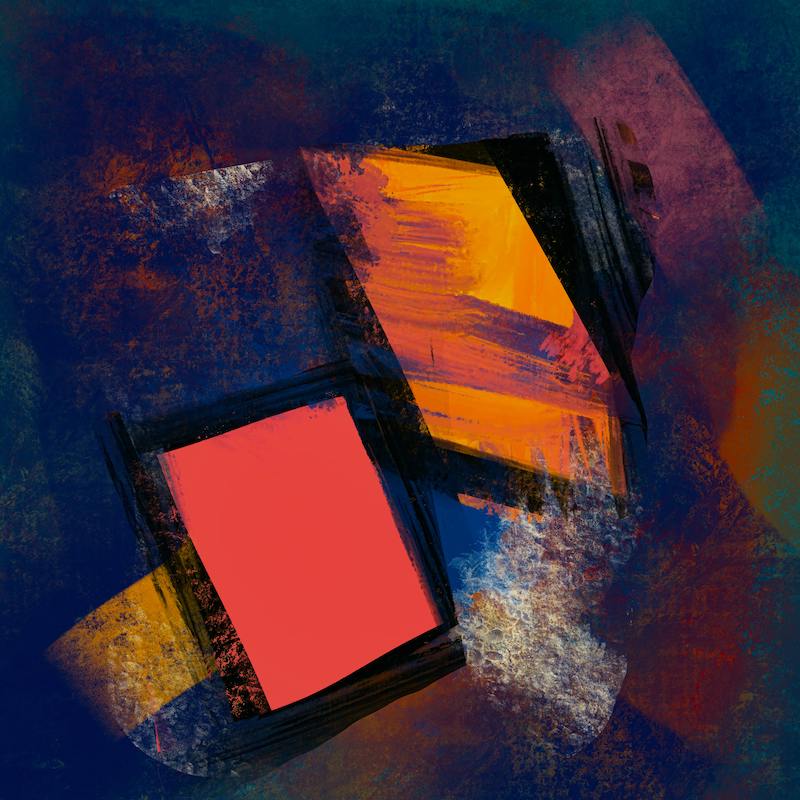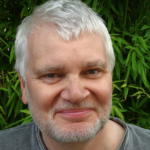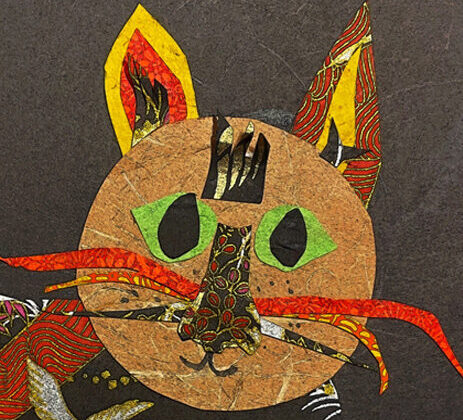Alan Summers
Two Favorite Haibun: Unsettling Clashes

Photo by Steve Johnson from Pexels
When two different genres appear in a single package, it can be unsettling. But the “clashing” genres of haibun—the prose storytelling, the radical interruptions of haiku— also allow us to embrace unsettling things in startling ways. Kati Mohr offers a good example of this with “Dear Human, I don’t think poets are more troubled than others,” which originally appeared in The Other Bunny (Sept. 2, 2024). It is a tour-de-force of haibun, both literary and poetic. More than just a journey of observational boxes being ticked, it’s educationally self-revealing—not only of the author, but also of any reader prepared to enter the territory of a deep revelation.
Dear Human, I don’t think poets are more troubled than others
Self-harm exists on a spectrum. The mildest, most invisible to the outside, the one that hurts so much on the inside, is that I bury my feelings.
succulents stripping in my skinHardly anyone can tell when I need to cry. I don’t realise it, too, I just stand beside myself and watch my smile as if it were one.
parentification
echoes of an echo
come backI believe that when you grow up in love but it’s not the one you need, you learn to throw it against the wall under a different name, like shadows.
sleepwalkers an intimate cup of poet’s jasmineOne day you turn around to the sun and weep in horror, because it’s bright, it’s big, shifting the shadows to become real. The ground disappears into them.
a late evening sun,
we mark the foothills
in the dustAgain I can’t cry. It is a new day. I carry guilt and shame, unclear if they are really mine.
semicolon tattoo
making myself
sighWhen I seek expression for the turmoil within me, I crank up the volume, let the singers scream for me. That’s better than being completely silent.
death growl petals enter the etherBut I don’t know what real silence is. So often something inside needs sorting, nurturing, is wild, wants everything everywhere all at once.
spring tide the headlines after OpheliaI think we have art to keep us alive.
sunset meadow
it is as if there were
a thousandfold of bars*I feel like I need to apologise, but I don’t want to. No-one’s eager to see this. But it’s human to get lost. To be found. To struggle with oneself.
microscoping class
the world composed
in breakdownSelf-harm is a state, it begins, it ends. Turn the pain inside out like a sock. An illusion: to think we’re at any given time the same person.
the realm of and
i’ve held a snowflakeSomeone thought they should comfort me by saying the wounds will surely disappear. I look at the old scars on my arm and think: they’ve never bothered me,
but the humans
do unkind things …
reading from the prophecyMy consolation now is to see my scars. I read in their existence like I read poems, and write some, and the most important of them are like socks, too.
I study Joseph Wright’s play of light for a long while
if I just had a final say in it, and I have
*Excerpt of “Der Panther,” Rainer Maria Rilke. Translation by Kati Mohr.
Kati Mohr’s haibun could have easily been titled “Self-Harm,” though that might have repulsed or frightened off readers, or made them feel that’s all they need to read (the title as retail label). Instead, she chose a title that is like a hook and pause, allowing the reader to ponder the theme. Addressing the reader as “Human” implies that an alien from another world is speaking—or that the speaker is alienated, both from others and herself. “Alien’ is certainly a term that means so many different things, often negatively.
Kati waits to unveil her intended subject matter until the first prose stanza, which acts as scaffolding for the first poem.
succulents stripping in my skin
Succulents are known for their ability to store sap that can sometimes be toxic. Here, the arresting addition of the preposition “in” makes it more personal and visceral. Another two-sentence paragraph, and we come to a poem with a very long, single-word opening line: “parentification,” A parentified child may be required to take care of their younger siblings or referee their parents’ arguments,1 and the ramifications rebound off both title and opening prose sections.
Both poems show how haiku assist in unexpected ways, offering short respites from prose passages and weaving paths as side information, a little like dialogue in a novel. Each prose stanza tackles the author’s point of view and personal health, with short poetic interruptions that combine haikai characteristics such as natural history and symbolism with concision and white/negative space. The symbolism runs deep in the third haiku,
sleepwalkers an intimate cup of poet’s jasmine
The flower is Jasminum officinale (common jasmine, poet’s jasmine, poet’s jessamine, summer jasmine or true jasmine). In addition to referring back to the title’s mention of “poet,” it conjures multiple associations: love, purity, and sensuality; the medicinal properties of calming sedatives; aromatherapy as a way to relieve stress and anxiety. It’s packed with hidden behind-the-scenes information.
It’s such combinations of haiku with devastatingly honest prose that gives the haibun its power. Kati approaches difficult subjects in a factual manner. I do the same in my haibun “Life Without Mars.” First published in the Pan Haiku Review (Issue 3), it conjures up a world without fear and aggression from certain quarters.
Life Without Mars
There is an increase of attacks of many kinds on women.
which dna your nail varnish on the beachesOne lionised man given as a reason for the English Race Riots of August 2024 to target female police officers, and women seeking asylum.
it’s not just night the grit in my eye isn’t from cryingUK / USA women: British Olympics athlete Bianca Williams pulled over for driving from a training session to her home said “being black is a crime.” British Member of Parliament Dawn Butler stopped as police incorrectly typed the vehicle registration. Sandra Bland (car light malfunction, died 2015). This is for the unknown and known, and Ta’Kiya Young, dead at 21 for alleged shoplifting, fatally shot in her car: Unborn daughter also died from gunshot wounds.
police stop mom's hands on their car makes her late
There are some differences in how we approach these topics. My haibun contains nationally reported facts, including a zuihitsu-like insert of a press release, rather than facts from another type of front line (the author’s own). And while Kati presents her personal revelations in devastatingly honest prose, I use single-line haiku to give the personal viewpoint, with an ambiguous use of italics: are they lifted direct speech, or the lines of a new poem?
which dna your nail varnish on the beaches
it’s not just night the grit in my eye isn’t from crying
police stop mom’s hands on their car makes her latewhich dna on the beaches
it’s not just night crying
police stopwhich dna on the beaches it’s not just night crying police stop
(And is it police stop or please stop, or both? Again, the haiku allows unexpected readings and meanings.)
It’s also worth noting the similarities between the two pieces. Both include allusions and references from popular culture past and present, which can imbue a haibun, even invisibly/subliminally, with meaning and context. For “Life Without Mars,” it’s a classic song often played on jukeboxes after it came out in 1971: David Bowie’s “Life on Mars?”
It’s the freakiest show
Take a look at the lawman
Beating up the wrong guy
Oh man, wonder if he’ll ever know
He’s in the best selling show
Is there life on Mars?
There’s also an allusion to a book that’s been quoted extensively, although I’m not aware of whether this particular quote was openly publicised:
A man’s deepest fear is that he is not good enough or that he is incompetent. He compensates for this fear by focusing on increasing his power and competence. Success, achievement, and efficiency are foremost in his life … A man appears most uncaring when he is afraid.
— from Men Are from Mars, Women Are from Venus (John Gray, HarperCollins 1992)
In “Dear Human …” the allusions go back further in time. There’s Ophelia from William Shakespeare’s play Hamlet (1599–1601), a noblewoman of Denmark and potential wife of Prince Hamlet; his manipulative and vengeful actions force her into a state of madness (gaslighting?) and she ends up drowning herself. There’s also Joseph Wright (1734 –1797) an English landscape/portrait painter who captures the birth of science out of alchemy, and the German poet Rainer Maria Rilke (1875 –1926), whose undertones of mysticism explore themes of experience and disbelief. The lines quoted, “it is as if there were / a thousandfold of bars,” are taken from his famous poem “Der Panther.” Here’s the actual end of that poem, left in the white space of “Dear Human …”:
An image enters in,
rushes down through the tensed, arrested muscles,
plunges into the heart and is gone.2
It’s an apt description of what’s happening in both “Dear Human…” and “Life Without Mars,” neither of which is afraid to confront the reader and reach past any defences. Both show that, yes, we haibun writers can embrace things that are unsettling, like many poets elsewhere—except that the companionship of prose and haiku produces startling results. This clashing of genres is not a barrier but a cause for celebration. And for any writer who feels unsure about using haibun to tackle hard topics, I’ll let Kati have the last words:
if I just had a final say in it, and I have
Notes:
- From Psychology Today, United Kingdom: “Parentification is when a child is forced to take on the role of a supportive adult within their family. For example, a parentified child may be required to take care of their younger siblings or referee their parents’ arguments.”
- Translation by Stephen Mitchell (Brooklyn, New York): poet, translator, scholar, and anthologist known for translations/adaptions of Tao Te Ching, Epic of Gilgamesh, and Rainer Maria Rilke, among others.
About the Author

Alan Summers is founder of the Call of the Page website, featuring one-on-one mentoring sessions and online courses, and The Pan Haiku Review. A previous editor of the British Haiku Society’s Blithe Spirit (2018) and the Red Moon anthologies (2000–2005), he had a winning haibun in the Bournemouth Writing Festival Poetry & Flash Fiction 2024 anthology, Lines in the Sand.

This article blew me away. Alan guides us through the nuances of a take no prisoners haibun.
Thanks Pris!
Haibun gives us an opportunity to go beyond the perceived confines.
Speechless. It felt as if I couldn’t move. Once I began reading, I couldn’t stop. Both separate and together, these two haibun leave a mark. As if one has been seared.
Thank you for writing. Whew!
Wow, thank you!
I’m humbled that you see the honesty and force. We are heading into even more difficult times, that I’d rather not imagine.
Alan
Alan, I must echo Jo’s comments above – I was speechless and transfixed. As unsettling as it was to read, it was impossible to stop. What a world we find ourselves in now. As with you, I’d much rather not imagine where we will find ourselves in the coming months.
Oh, to be taking lunch with you in Bath again!
Gary
Thank you Gary!
The Holburne Museum café is always there, and now dog-friendly, if you love wee canny canines! 🙂
We enter an ever more frightening era. There will be even less funding for what is right morally.
As writers, whatever stance we take, whether to uphold a long lost beauty, that may be rediscovered, or record horrors just as was done in WWII and continued with other violent war crimes.
It was weird and strange that some of us may join the exulted company of once-banned or to be banned again writers past, present, snd coming future:
James Baldwin
Hedy Lamarr
Aldous Huxley
Bret Easton Ellis
Elizabeth Smart (who may or may not be a distant relative)
Isabel Allende
Gabriel García Márquez
Charlotte Brontë for Jane Eyre (1847)
Lewis Carroll for Alice’s Adventures in Wonderland (1865)
Shen Congwen (1902–1988)
George Orwell for Animal Farm (1945)
Sir Walter Scott (Ivanhoe)
Charles Dickens (Oliver Twist)
Jack London
H. G. Wells
A few books by contemporary woman authors that have been frequently banned include:
Beloved by Toni Morrison, The Handmaid’s Tale by Margaret Atwood; The Color Purple by Alice Walker; Persepolis by Marjane Satrapi; Fun Home by Alison Bechdel; Judy Blume’s and Sarah J Maas’ Utah outlaws books a few months ago in 2024.
We all have a duty to write, whatever is our choice of topic or style, so something is left to be found again. The spark of original writing is of course very dangerous, even if we dare speak of dandelions and wine or of something wicked (Ray Bradbury books).
Real talk. Real and human, shying rightfully away from euphemisms, honest. Thank you for this essay, Alan. I didn’t know in detail what you would be writing about when you asked for my permission to pick one of my haibun for this feature, but if I had, and you hadn’t already chosen to do so I had begged you to do it. People might feel uncomfortable reading this, but I believe they should rightfully dive into that feeling and ask themselves why, and why a haibun shouldn’t be able to gracefully hold that what is most human: being human and also being the best and the worst and a struggling one. We need that mirror, and truthfully, honesty has always been what I admired in any writing.
Thank you for much for this. It was very trusting of you to allow me to select a haibun by you, though not saying which! 🙂
The more I read and re-read your haibun I realised it was the right one amongst so many worthy other pieces.
I guess our joint subject matter may be uncomfortable reading, though that is the dark side of society we should not shy away from, after all, aren’t we are society too, aren’t we?
Alan